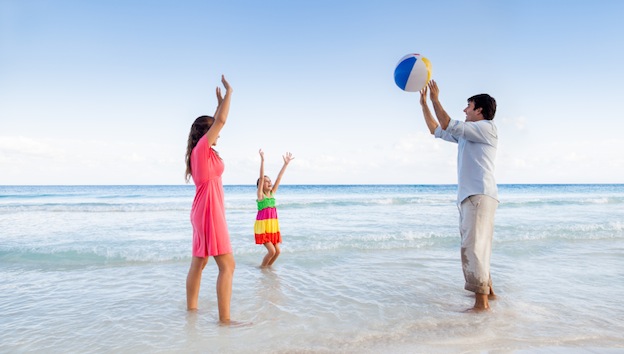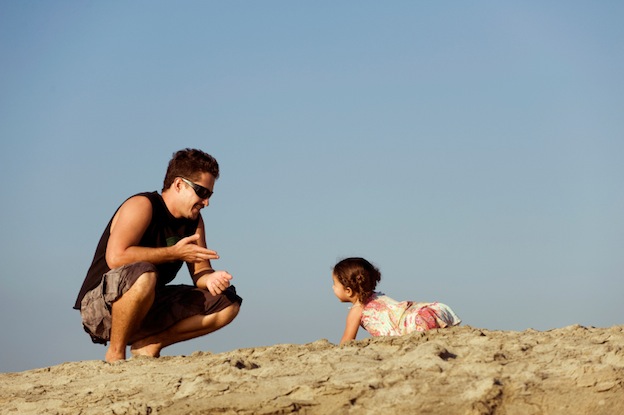SingaporeMotherhood | Baby & Toddler
October 2013
Positive Parenting

Positive parenting. You’ve probably heard these words while in conversation with other mums and dads, or maybe read them in a magazine. But what does positive parenting really mean?
In her website Aha! Parenting, clinical psychologist and parenting expert Dr Laura Markham describes it as “guidance that keeps our kids on the right path, offered in a positive way that resists any temptation to be punitive.”
[banner][/banner]
It works, she says, because “positive parenting raises a child who WANTS to behave.” Sounds good? Definitely. Which parent wouldn’t want that? There’s a catch though. In positive parenting, as its moniker implies, the onus is on you, the parent.
“Parenting isn’t about what your child does, but about how we respond,” explains Dr Markham in her book Peaceful Parents, Happy Kids. This means that you, the parent, have to be conscious of your own parenting behaviour because most parenting does not take place between a parent and child. It takes place within the parent. In short, your positive behaviour equals your child’s positive behaviour. Easy, isn’t it? Well, it depends.
In his 1999 book Children Are From Heaven, author John Gray stresses the importance of changing the way we parent. After 30 years of research, he concludes that the old way of parenting – inducing fear and guilt in children – is not ideal.
A parent using intimidation and violence to control a child sends the message that aggression is right, he writes. Yelling, while milder than hitting, leads a child to tune out. In the long run, Gray says, this will affect a child’s communication skills in a negative way.
His solution? Minimise resistance. Ask, instead of ordering or demanding. Use “would you” instead of “could you”. Use the word “let’s” as this invites direct participation from both parties.
No Punishment
Can you remain calm when your child repeatedly misbehaves? You’d have to try, because in positive parenting, there is no punishment. The belief is that punishment will make the parent an enemy to hide from, instead of someone to turn to for support.
It is more effective to reward, even when the promised reward is the very thing or privilege that you were going to take away as punishment. For example: “If you do your homework now, you’ll have more time to play video games afterwards”.
So instead of spanking, caning or grounding, positive parenting employs the use of time-outs. Dr Simon Ng, a paediatrician in private practice, recommends that a one-year-old child of gets one minute of time-out, a two-year-old gets two minutes, a three-year-old gets three minutes, and so on, the length of time increasing in proportion to a child’s age. This time-out guideline can also be used in ‘thinking chair’ situations or when getting a child to to cool down in a quiet place away from the problem.
Clear Rules
“When we discipline children, we are training them to behave in socially acceptable manner and to build in them a moral compass which directs them in making decisions that lead to success in life,” says Grace Yong, the Founding Principal of Character Montessori.
When the trainee does not adhere to rules or challenges the authority of the trainer or coach, there are consequences. If sports, the trainee may be asked to run or swim extra laps. He or she may also be banned from playing in a game. These are rules that the trainee knows and understands.
Similarly, in disciplining children, rules must be made clear, says Grace. Parents should explain the reasons for the rule, as well as the consequences for not following it.
Grace breaks it down in this example:
Rule: You must keep your toys after playing with them.
Reason: This is to make sure that your toys do not get lost or become spoilt.
Consequence: If you do not put away a toy, you will not get to play with it for a week.
These rules and consequences must be adhered to, says Grace. Although parents may help the children keep their toys at first, the children will gradually have to do most, and eventually all of the work by themselves.
Affirmations
Grace also encourages parents to use affirmation as a means of motivation. “Something simple, like “Thank you for keeping your toys all by yourself”, can help fertilise the desire in children to continue doing the right thing,” she explains. In contrast, if the rules are not followed, parents must follow up with the consequence, such as confiscating the toy.
“It is a myth that positive discipline spoils children. Positive discipline is all about training them to be responsible for their own behavior. When we discipline children in this manner, we prepare children to live in the real world, where there are rules, expectations and often costly consequences when we fail to live up to them,” Grace says.
Positive parenting works, assures Grace, because:
- Children know where their boundaries are, so they feel secure.
- When children do the right thing, and we affirm their actions, they grow up in an environment where they feel confident that they can do what is right.
- Children learn from a young age to make decisions based on reasoning. They know why they should follow a rule and the consequences if they don’t. This helps them decide if they should obey it.
- Children accept the consequences when they make bad choices and are able to learn from that.
- Children learn to respect rules and others because they are given the due respect by adults. We don’t criticise or tear them down – Questions like, “Why are you so stupid? Why can’t you be like your sister? What is wrong with you?” are replaced by “Tell me what the rule is? Do you know why it is important to follow it? Why didn’t you obey it? What do you have to do now?”
Positive Parenting in Real-life
Grace Yong, Founding Principal of Character Montessori, has four sons aged 21, 19, 17 and 12. She raised them using positive parenting methods. She says that the results have been “very encouraging”.
“People think that if we don’t scream and yell or threaten children, they grow up soft. That can’t be further away from the truth. When we treat children with respect and teach them to respect others, we also teach them self-respect. They will not put up with people trying to bully them or pushing them to do something they don’t want to do. When children grow up knowing their boundaries and feeling secure, they will have the courage to stand up for what they know is right.
When my eldest son Paul was in junior college, he attended a friend’s birthday party. He told me that there was free flow of liquor there. Many of his classmates were so drunk that they could not get home that night. I asked Paul why he did not get drunk like his friends. He said that he did not see any good reason to do so and he did not fancy being out of control.
My 17-year-old, Daniel, came home from an afternoon at his friend’s home and told me that he had offered his friend’s mother advice in managing his friend’s 14-year-old sister. When her mother lectured her, the girl rolled her eyeballs, grunted and walked off, with the mother yelling after her. Daniel suggested that his friend’s mom could try a more fruitful way of dealing with her errant teenager. He shared what I do with him – sit him down, remind him of the rules, ask him to reflect on why he had failed and then require him to face the consequences. “See Mom, I am preaching what you practice!” he said.”
All content from this article, including images, cannot be reproduced without credits or written permission from SingaporeMotherhood.
Follow us on Facebook, Instagram, and Telegram for the latest article and promotion updates.






